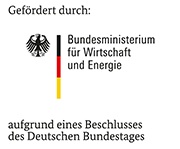16432 N

Hochtemperaturofen in Betrieb
| Laufzeit: | 01.12.2009 - 31.05.2012 |
|---|---|
| Geldgeber: | Bundesministerium für Wirtschaft und Technologie über AiF |
| Bearbeiter: | Barbara Rammer |
| Arbeitsgruppe: | Hochtemperaturwerkstoffe |
Sewage sludge is a practically endless source of the essential plant nutrient phosphorus. However, removal of their heavy metal contents is obligatory to enable the application of sewage sludge ashes as fertilizer material. A thermochemical process accomplishes this separation in high chlorine containing environments at temperatures of up to 1000°C.
Unfortunately there are no furnace materials commercially available that can withstand such conditions over longer periods of time.
Previous experiments have shown - in accordance with thermodynamic calculations - that corundum is resistant to oxidizing high-temperature chlorine corrosion conditions. Although it offers outstanding corrosion resistance, its mechanical properties - in particular its brittleness and low thermal shock resistance - make it inapplicable as a material for large moving components such as rotary furnace tubes.
A new coating concept combines the chemical resistance of corundum with the mechanical properties of an alloy. It consists of a two-layer thermal spray coating system with a ceramic top coat (APS) and a corrosion resistant metallic NiAlMo bond coat (HVOF) that is specially designed for the use in reducing chlorine environments as can be expected under the ceramic top coat.
zurück
Das IGF-Vorhaben Nr. 16432 N der Forschungsvereinigung DECHEMA e.V., Theodor-Heuss-Allee 25, 60486 Frankfurt am Main wurde über die AiF im Rahmen des Programms zur Förderung der industriellen Gemeinschaftsforschung (IGF) vom Bundesministerium für Wirtschaft und Energie aufgrund eines Beschlusses des Deutschen Bundestages gefördert.
PD Dr. Mathias Galetz
Tel.: 06172 89938-993
E-Mail: mathias.galetz
B. Rammer, M.C. Galetz, Materials and Corrosion 68 (2017), 186
M.C. Galetz, B. Rammer, M. Schütze, Materials and Corrosion 66 (2015), 1206
M.C. Galetz, B. Rammer, M. Schütze, Oxidation of Metals 81 (2014), 151
B. Rammer, M. Schütze, in "Proceedings of Corrosion 2011" (2011), NACE
Abschlussbericht (pdf, 11,5 MB)